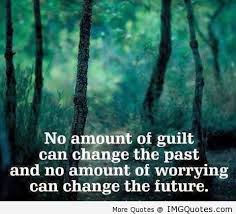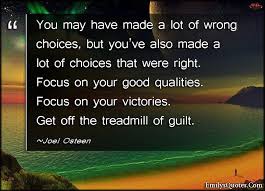“Move forward with no second-guessing, no guilt trips, no hesitation. Your purpose is to recreate yourself anew in each moment.” ~ Neale Donald Walsh
I’ve come to believe guilt is a useless emotion. Yet, it is an emotion many of us find ourselves tightly embroiled in its snare.
 Feelings of guilt, can you see yourself in this list?
Feelings of guilt, can you see yourself in this list?
• Guilt for something you did
• Guilt for something you didn’t do, but wanted to
• Guilt for something you said without thinking and caused hurt
• Guilt for something you think you did
• Guilt for your failures
• Guilt for your successes
• Guilt you think you didn’t do enough to help someone
• Guilt for giving into the one thing you said you wouldn’t do again (eat too much; drink too much; spend too much; work too much)
• Guilt for saying yes
• Guilt for saying no
• Guilt for staying in an abusive situation
• Guilt for leaving an abusive situation
• Guilt for staying in an unhappy relationship and feeling alone
• Guilt for leaving because you were unhappy and grew apart
• Guilt for not being satisfied and grateful
• Guilt for wanting more
• Guilt for surviving
Guilt. Guilt. Guilt.
It is amazing to me the torment this emotion can bring and the havoc it wreaks to many lives.
And for what purpose?
Why?
 The anger, blame and resulting destructive behavior can cause a downhill spiral over and over again.
The anger, blame and resulting destructive behavior can cause a downhill spiral over and over again.
Unless feelings of guilt are an instrument for positive and healthy change, what else does guilt do for us? Guilt is primarily a negative emotion and wastes a tremendous amount of precious time and energy creating feelings that erode our self-worth and self-esteem time and time again.
Guilt can be a positive reaction when the feeling comes from a reasonable point of view. Basically, when you have done something wrong which causes harm to yourself or another person you can feel remorse or regret and pain for having done so.
Once this occurs, you have a catalyst for positive change and growth to move forward.
Now you can create a plan for coping with these feelings to find forgiveness for yourself and the other person.
To imagine wrongdoings, “what if’s” or “if only” where we turn on ourselves and berate our thoughts with words of criticism and constant self-punishment is a recipe for creating self-destructive patterns resulting in anxiety, depression and isolation.
It is easier said than done to dismiss guilt all together but what I hope to convey is guilt does not serve anyone unless we are able to distinguish what is our fault versus what we “imagine” is our wrong doing.
As complex as guilt can be, our challenge is to not let it become all consuming. When that happens, guilt can become the worst for us. There will always be moments where guilt surfaces but we can keep it manageable and gain a better self-understanding with the ability to recognize when we have caused someone else harm. Guilt then becomes an agent for change and forgiveness instead of criticism and self-punishment. A much better place, don’t you agree?
Please go easy on yourself the next time guilt creeps into your life. Maybe this time, you will look at things differently and let it go sooner than you have in the past.
To you and always being good to yourself.
Leave a Reply